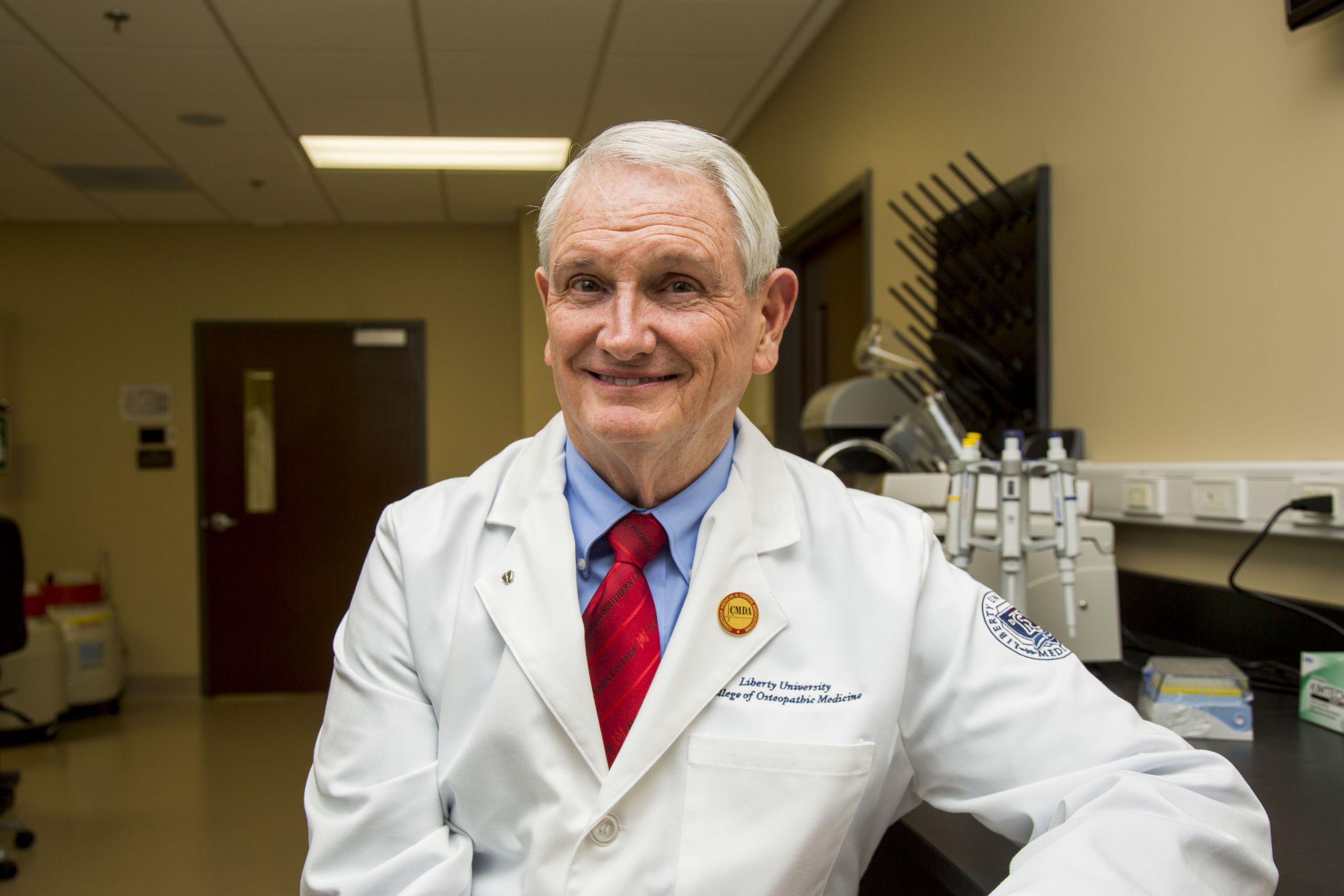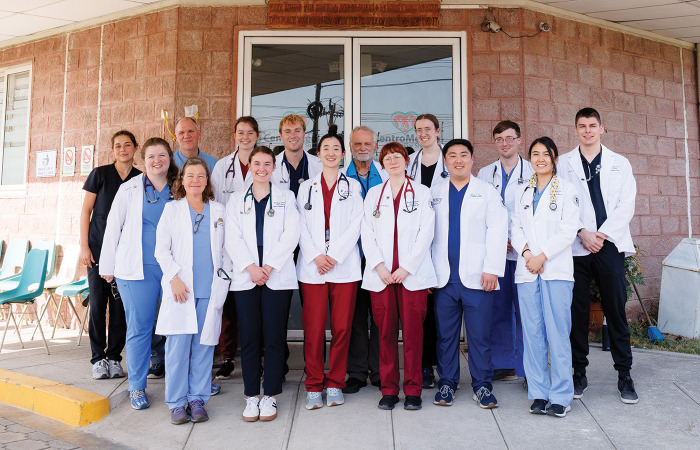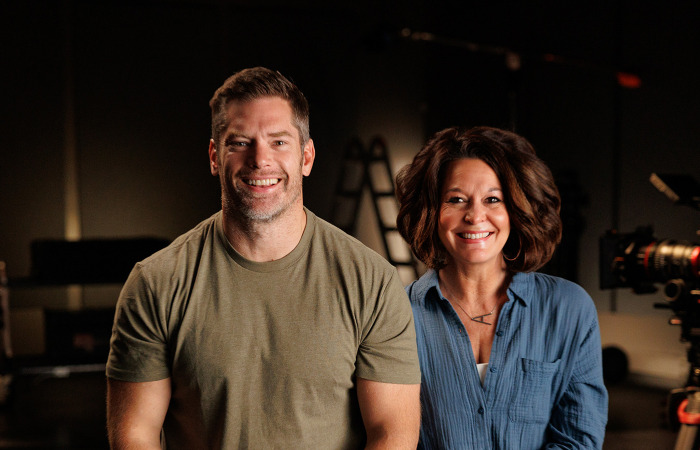LUCOM professor reflects on 30-year career in research that has helped thousands to hear
Despite 12 patents to his name, Dr. Kenneth Dormer, a professor and chair of integrative physiology and pharmacology at Liberty University College of Osteopathic Medicine (LUCOM), makes it clear that his work is not about what he’s accomplished, but about being obedient to what God has asked him to do.
“Whatever He equips us to do, whatever He wants from us, we just have to do it the best that we can,” Dormer said. “That’s it. I just happened to be at the right places at the right time, without question.”
Dormer’s 30-plus-year career as a scientist and inventor began almost by accident in the late 1970s in Galveston, Texas.
“I started out as a marine biologist,” Dormer said. “I went from marine biology to studying the sonar systems of dolphins and whales and trying to discern how they make their sonar sounds.”
According to Dormer, echo-locating mammals have some of the best developed brains for hearing in the world. He studied the animals more, completing his doctoral research, but soon realized that he would need a paying job to support his family. He took a job at the University of Oklahoma.
“I said, ‘Oklahoma? There’s no ocean in Oklahoma,’” Dormer said. “I thought, ‘That’s it. My dolphin days are over.’”
But it became clear that God had plans for him there and that his marine biology background would be useful. A few weeks after arriving, Dormer sat next to Dr. Jack Hough at a Christian fellowship event. Hough was a famous ear surgeon, who was also working with the university and was forming the first cochlear implant team in the United States.
“(Jack) told me his team had been waiting and praying for a physiologist who knew about the flow of electrical current in the brain,” Dormer said. “I joined the team, and we worked together for the next 30 years.”
They invented the Audiant Bone Conductor, a portion of the cochlear implant, and the MAXUM, a semi-implantable hearing device.

Dr. Kenneth Dormer helped develop a portion of the cochlear implant, used by over 300,000 people with hearing loss.
“When you hear something, your eardrum is vibrating. Sound moves these delicate ear bones in your middle ear, and then they cause fluid to move in the cochlea (the part of the inner ear that receives sound vibrations),” Dormer explained. “As the fluid moves, it separates the sounds to different frequencies and tweaks little nerves in the cochlea, which sends them to the brain. When someone is deaf, their nerves are dead, so you have to figure out how they can get that sound signal. The best way is to electrically stimulate those nerves that send signals to the brain.”
He said more than 300,000 patients have received the cochlear implant, which has greatly impacted their lives.
“There’s nothing like seeing the expression of a child who is born deaf hearing for the first time,” Dormer said.
Dormer’s background in marine biology and echo-locating mammal communication gave him an edge in co-developing the cochlear implant because of how the device can mimic sonar waves. He and Hough traveled to seven countries to showcase their work. Dormer explained the basic science behind the device, while Hough demonstrated how to insert it.
Both strong in their Christian faith, Dormer and Hough saw their work as an opportunity to show the love of Christ without preaching.
“Not all of the surgeons we worked with embraced, or were even favorable to, Christianity,” Dormer said. “But the credentials of our significant invention gave us a captive audience.”
Dormer was honored as Oklahoma Inventor of the Year in 1987 for his cochlear implant component and went on to develop two more implants with his teams. In 2014, he was asked to help oversee the startup of LUCOM.
Since coming to Virginia, Dormer has shifted his focus from auditory to cardiovascular research and to developing new nanomedicines using nanoparticles with colleagues at Virginia Commonwealth University in Richmond, Va. He also works with Liberty students who are interested in nanomedicine and connects them with professional organizations across the country.
“I’ve worked with ears and hearts, which is funny to me because they’re connected spiritually,” Dormer said, noting how the ears allow us to hear God’s Word and bring us closer to Jesus.”
Dormer said he is blessed to have a career that enables him to dive deeper into the wonders of God’s creation and where his faith can keep him grounded in a field that is quick to dismiss the idea of a supernatural Creator.
“The privilege of discovery — of finding something new that no one has before — is an incredible blessing,” he said. “The world says, ‘Look at me, look what I discovered.’ The Christ follower says, ‘Wow, what a privilege to have found out something that only God knew before — isn’t our God creative and fantastic?’”
LUCOM prepares for its first graduating class
In May, Liberty University will mark an important milestone as it graduates its first class of student-doctors from the Liberty University College of Osteopathic Medicine (LUCOM).
LUCOM’s Commencement ceremony on May 19 will feature the famed neurosurgeon Dr. Ben Carson, former presidential candidate and current United States Secretary of Housing and Urban Development.
Until then, LUCOM’s fourth-year students are hard at work finishing clinical rotations and interviewing for their residency placements, which will begin after graduation.
On March 16, fourth-year students will participate in LUCOM’s first Match Day Celebration, when the National Resident Matching Program (NRMP) informs applicants of where they’ve been placed for their post-graduation residency training. A residency allows a newly graduated medical student to train in the specialty of their choice and may take three to seven years to complete. An honored medical school tradition, Match Day is observed by student-doctors around the country opening their letters together in a school-wide ceremony.
In late March, several LUCOM fourth-year students will serve with Samaritan’s Purse on monthlong medical rotations in Rwanda, Kenya, and Zambia.




